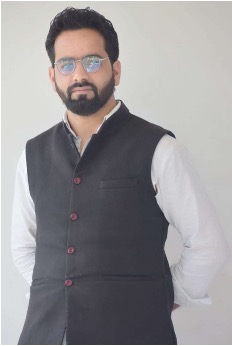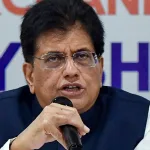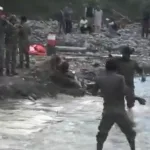In the long, turbulent history of Kashmir, where grief often blurred into resignation and tragedy hardened into cynicism, the recent uprising of conscience stands as a profound rupture. For the first time since Independence, the Valley has witnessed an extraordinary phenomenon: a spontaneous, people-driven protest, not against governance, not against authority, but against the very forces of terror that once claimed to speak in the name of its people. Across the narrow alleys and open fields, from Srinagar’s bustling Lal Chowk to the quiet hamlets of South Kashmir, shutters closed, hearts opened, and voices rose — not in anger at the state, but in defiance of terror.
This extraordinary shift is not an accident of history. It is the product of a slow, patient, courageous transformation — a revolution not of slogans, but of trust. A revolution authored quietly, meticulously, and uncompromisingly by Lieutenant Governor Manoj Sinha. At the heart of this transformation lies a principle that sounds deceptively simple but carries the weight of civilizational wisdom:
“Begunah ko chhedo mat, aur gunahgar ko chhodo mat” — Touch not the innocent, spare not the guilty.
This is not simply a tagline. It represents the moral order on which Lieutenant Governor Manoj Sinha has rebuilt the broken relations between the people and the state. In an area where power once seemed to be a remote and passive entity, Sinha scaled governance from the towering aspirations of the marble corridors to the crude, dusty reality of the pavements. He did not try to ‘rule’ Kashmir; he soothened its wounds.
Unlike others who mistook administrative instructions for leadership, Sinha understood that authority cannot be enacted in decrees at a given location – in this case, Kashmir – but rather, needs to be painstakingly earned, one village at a time, one grievance at a time, one tear at a time.
He ventured into the most desolate parts of villages where hope had long been extinguished. He met mothers who had lost their children terrorism and gave ears to narratives filled with pain. He did not hear them as a ruler hears his subjects but captured and garnered tales as a human being to a fellow human being. The governance is not management of emotion termed as rebellion, but rather acceptance of sorrow experienced; affirmation of anguish, and a relentless endeavor to restore lost honor.
Sinha did not pull out bureaucratic cliches when Rajouri was hit after the shopian Fake encounter. He was the first to arrive at the doorstep of the wailing families, the first to offer justice, and most importantly, the first to fulfill that promise. In a land haunted by the ghosts of fake encounters and broken promises by the previous governments ruled by the regional Political Parties , his unflinching insistence on fairness — even at the cost of institutional discomfort — was a rupture from the past.
Under his leadership, Kashmir achieved something unimaginable: not a single fake encounter reported. It was not a statistic; it was a resurrection of faith in the idea that justice could be real, and not merely rhetorical.
It is from this painstaking, patient work that the uprising of conscience we now witness has emerged. The valley-wide hartal following the Pahalgam terror attack was not the result of diktats from separatists or sermons from politicians. It was the spontaneous moral verdict of a people who had, perhaps for the first time in living memory, found the strength to say: Terrorism is not our voice. Violence is not our future.
The protests marked more than just the death of people. It was a mourning of a memory that is long lost, a future that never came to be, and a fierce reclaiming of both. Kashmiris weren’t out for vengeance, they took to the streets seeking for peace. Not protesting bound to state suppression, but protesting against the denial of their identity caged within violence. A trust was born through these protests: a belief that there exists a government which will without fear or political motives, protect the innocent and target the guilty.
From the lens of a larger world framework of political violence Kashmir is culturally and ethnically experiencing the unfolding of something symphonic. Governance has transformed from an inhuman mechanical act of only exercising authority to a dialogue field of values between the rulers and the ruled. The shift comes from fear to faith as the medium of dialogue, and from top-down order to empathy. And in deciding that strength is not cruelty, and governance is not violent control. Manoj Sinha, by refusing to confuse strength with cruelty or governance with coercion, has become the architect of Kashmir’s new moral awakening.
The Kashmir region’s volatility poses a threat to world stability, but a potential catalyst for change was captured when Manoj Sinha first took his position as Lieutenant Governor. Unlike other world leaders today, Manoj Sinha has adopted a strategy based on the governance of trust instead of fear, and dignity instead of mere empathy.
His approach offers a powerful counter argument to the idea that regions broken by violence can only be ruled by the iron fist. It shows that the slow work of human connection, the insistence on fairness, the refusal to sacrifice principles at the altar of expediency, can — and does — change the arc of history.
For decades, Kashmir was seen as a riddle without an answer, a wound without a cure. Today, under the leadership of a man who dared to believe otherwise, it offers a different story — a story still fragile, still incomplete, but shining with possibility. A story where the people of the Valley, long spoken for but rarely heard, are at last speaking for themselves — and what they are saying is nothing short of a moral resurrection.
History will remember Manoj Sinha not merely as an administrator who governed Kashmir. It will remember him as the leader who, without fanfare or fury, without conquest or capitulation, gave Kashmir back its greatest gift: The right to hope, the right to heal, and the right to live without fear.
In the whispers of every protest, in the courage of every Kashmiri who today stands against terror, one simple creed now echoes through the mountains and meadows, stronger than any bullet, louder than any bomb:
“Begunah ko chhedo mat, aur gunahgar ko chhodo mat.”
(Touch not the innocent, Spare not the guilty)
And through that sacred balance, let a people long betrayed finally find peace.
(The Author is a social and peace activist based in South Kashmir. He is a Rashtrapati Award recipient in world scouting and has contributed to many local and national publications on a diverse range of topics, including national security, politics, governance, peace, and conflict)








